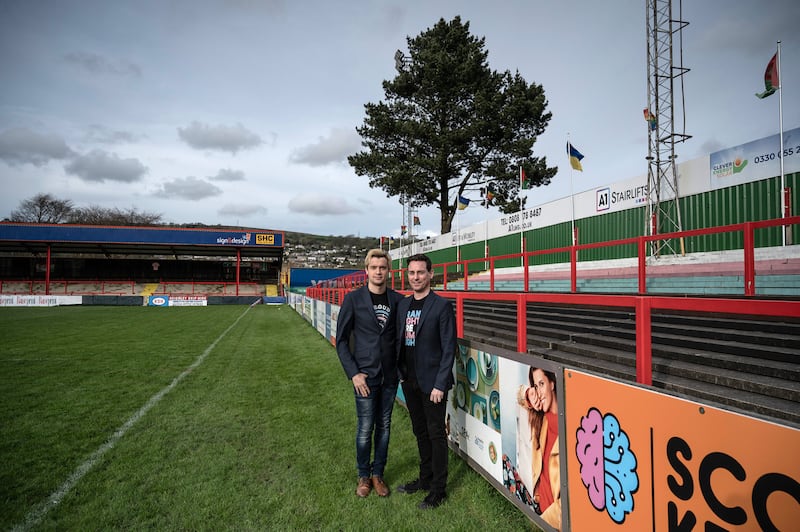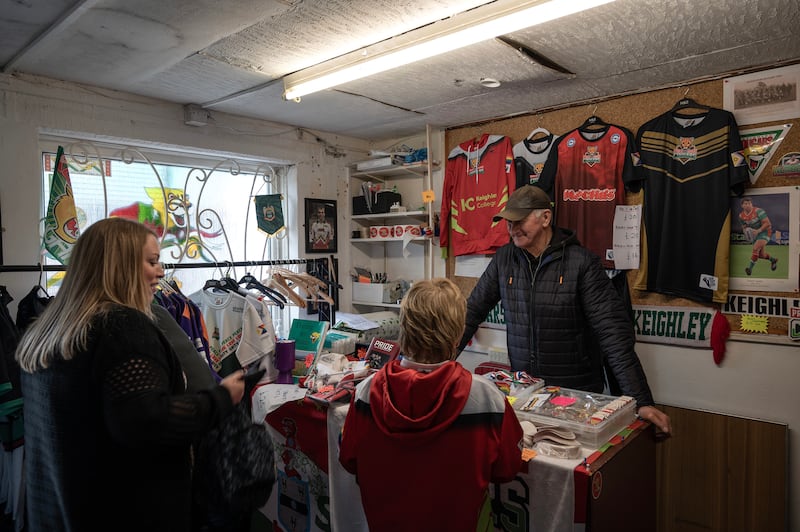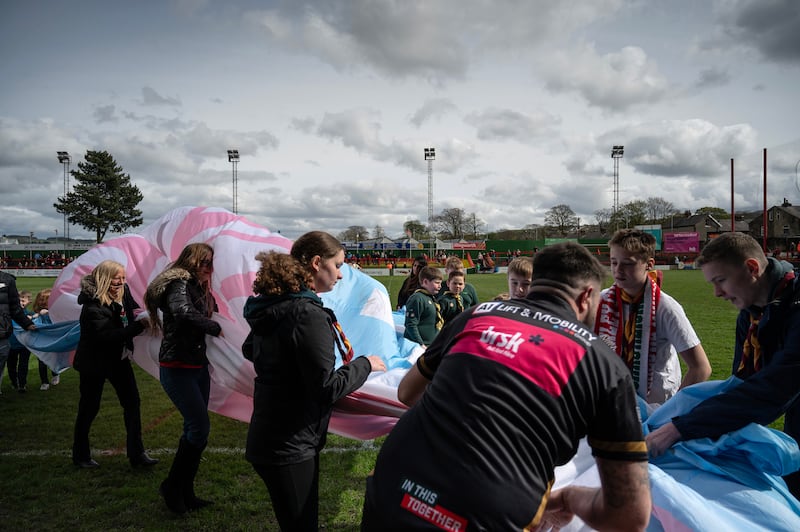Kaue Garcia and Ryan O’Neill had owned a sports team for no more than six months when they decided the time was right to shake things up. What they needed more than anything else, they felt, was a drag queen.
They were not entirely sure what the reaction would be. Keighley Cougars, the English club they had bought almost as an act of mercy, was not an obvious place to start pushing boundaries.
Keighley is an old textile town, surrounded by the windswept moors of Yorkshire’s Brontë country. The scars of postindustrial decay remain vivid here: spectacular scenery that houses some of the most deprived areas in England. And the Cougars play Rugby League, an especially brutal iteration of a famously bruising discipline.
Largely the exclusive preserve of old pit towns in northern England and northeastern Australia, it is a tough game, played by tough people, in tough places.
The plan hatched by Garcia and O’Neill, then – to arrange a Pride-themed day at Keighley’s stadium and to employ a drag queen as the pregame entertainment – seemed ambitious.
“We were worried nobody would come,” O’Neill said. His husband feared an even more stinging rebuke. “We’d put a drag queen on the middle of the field, have a big party, and everyone would just disappear,” Garcia said.
On the other hand, there were some reasons for hope. When they had bought the team, at the start of 2019, they had become – as far as they knew – the only gay owners of a men’s sports team anywhere outside the United States.
Nobody had really seemed to mind. More than anything, the town seemed grateful for their presence. Far more important than their sexuality was that they had saved Keighley’s beloved team from the brink of bankruptcy. By this year, they had plenty of credit in the bank.
Rugby League, too, had proved a more welcoming space. The men’s version of the sport has had a number of openly gay players and referees, something that cannot be said – for example – of men’s soccer.
The Keighley Cougars mascot dances before the match. Photograph: Mary Turner/The New York Times
The couple realised, though, that tolerance and acceptance are not necessarily synonyms.
They knew that a drag queen might be pushing their luck. But they knew, too, that they were going to do it anyway.
The name of the Cougars’ stadium is rather grander than its reality: the roofs of the two covered grandstands at Cougar Park are weather-beaten, corroded and pockmarked with dents left by stray rugby balls. The other two sides consist of exposed concrete terraces. Under Garcia and O’Neill’s tenure, all of it has also become a riot of colour.
This year, I have been to a handful of the Cougars’ games, watching the team in the spitting rain of spring, the fine drizzle of summer, and the torrential downpours of autumn. On each occasion, my six-year-old son has come along, too, partly because he suffers terribly from FOMO and partly because it means an afternoon watching sports can be called “parenting”.
My son does not see Cougar Park as a tumbledown sort of a place, four rickety stands in a drab industrial park just around the corner from the place we go to drop off the recycling. It is, in his mind, bright and captivating: the lurid neons of the candy stall; the deep green and red of the Cougars flag he waves during games; and, most of all, the rich, vivid hues of the rainbow.
That is the most obvious impact Garcia and O’Neill have had: Just about every available surface at Cougar Park is plastered with the colours of the Pride and the Progress flags. They flutter from soaring flagpoles, towering over the stands. They have been fastened to crowd-control barriers.
They have made it on to the field, too. The team started to swap out its traditional green, red and white jerseys for ones incorporating the Pride colours. Next season, the players will wear the colours of the trans rights movement. Nobody, Garcia said, should be in any doubt: “Everyone is welcome here.”
He and his husband had not bought the team for the express purpose of using it to make a statement. They had, instead, fallen into running it almost by accident. Five years ago, O’Neill saw a couple of news reports that suggested the Cougars, after years of mismanagement, might be about to be shuttered for good.
He had grown up nearby. In the 1990s, his father had invested in the team, As a child, he had been an ardent fan. He knew how important the Cougars were to the town and persuaded his husband – born in Brazil, blissfully ignorant of the existence of Rugby League and Keighley itself – that they should step in to keep it alive.
Neither of them thought they would have to run it.
“We thought we’d save it, go back to London and get on with our lives,” O’Neill said. “Someone had been running it for all these years. We just thought we’d leave it to be run by whoever that was.”
It did not take long for that particular illusion to be shattered. On the day they took possession of Cougar Park, a staff member pressed an invoice for £25,000 into O’Neill’s hands: the bill for the team’s kit. That was just the first debt that needed to be paid. They met the staff and asked who was in charge of this stuff. “They told us that was us,” O’Neill said.
The couple checked into a local hotel. They would, it turned out, be sticking around. “Imagine, your husband tells you you’re going to stay in a hotel for three months,” Garcia said. “You think that would be nice. Instead, it’s a Travelodge. And you’re here, every day, cleaning. I didn’t read the fine print. Lesson learned.”
Having grown up in the area, O’Neill did not remember it as a bastion of tolerance. He knew that Keighley is the sort of place politicians and provocateurs like to cast as being overlooked and underestimated by the distant, sneering elite, the sort of place presented as a repository of traditional – a synonym for right-wing – values.
Memory might have led him to downplay his sexuality, to hope it faded into the background, but he is – by his own volition – a “natural campaigner.” He had never really meant to run the club, but if he was going to do so, he was going to do it his way. “Sport is just such a powerful platform for these messages,” he said.
The rainbow flags went up. The jersey was redesigned. And plans for what they believed to be the first designated Pride game in British sports, complete with a drag queen, started to be formed.
Initially, the scheme concocted by O’Neill and Garcia might be described, perhaps a touch unkindly, as harebrained. As well as the drag queen, they tried to hire Katie Price to appear at Cougar Park, too. They thought that might soften the blow to any fragile masculine egos.
When Price backed out on her initial acceptance, citing illness, they decided to press ahead anyway. The day of the Pride game, they were sure, had been a success. They had sold out of jerseys. The stadium had been far busier than normal. And, watching on from the sidelines, it seemed most of the fans had enjoyed Miss Ivy Rose’s performance of “Lola” and “It’s Raining Men.”
And then, a few minutes later, they noticed a fan marching toward them. Through the medium of mime, Garcia intimates that the man in question was older, possibly tattooed, and similar in scale to some of the team’s players.
“I remember it to this day: He walked up to us, this big guy,” Garcia remembered. “And then he shook our hands. He told us he’d never met any gay people before. He’d had this different idea of what ‘gay’ was. But he had absolutely loved it.”
The Keighley that Garcia and O’Neill have found is not the Keighley of popular perception. It is not even the Keighley that O’Neill remembers from his childhood. Every time they have worried they might be moving too quickly, they have found the club – and the town – running alongside them.
The flags are now simply a part of the skyline. Some fans sit and drink lager from plastic pint cups, happily wearing replica jerseys bearing the Pride flag. Others stand on the terrace that has been repainted in the rainbow colours. The long-standing fans have kept coming, and they have been joined by sections of the town that might once have regarded a Rugby League stadium as hostile territory.
“Gay people and trans people did not have a place to go in Keighley,” Garcia said. “But now you can have these friendships here. You are not going to find a more welcoming place. The club has always been at the centre of the community. A home game really is the best day out in Keighley.”
All they have done is make more members of that community feel as if they have access to it. “We just added rainbows,” he said.
All sports owners face criticism, of course. At various times, Garcia and O’Neill have been taken to task over results, over coaching appointments, over player recruitment – all of the standard stuff.
But there have been times, too, when they have had to deal with more pointed and more personal attacks: Online, there are occasional bouts of homophobic invective; in real life, there is its more insidious cousin. “People do sometimes ask whether we really have to make such a big deal of it,” Garcia said.
Five years in, though, they remain pleasantly surprised that those instances remain the exception rather than the rule.
Their confidence has grown to such an extent that earlier this year, they invited India Willoughby, a high-profile trans activist, to become the club’s patron. She accepted the role in the hospitality suite at Cougar Park as sponsors and families ate a roast beef dinner cooked under the watchful eye of O’Neill’s mother, Jacqui.
The soft-spoken O’Neill felt unusually anxious that day. Willoughby has long been a target for abuse on social media, where trans rights have become a particularly toxic issue. While O’Neill wore a T-shirt emblazoned with the slogan “Trans Rights Are Human Rights,” his voice quavered as he invited her to speak.
Two minutes later, as she finished, she was met with a storm of applause. O’Neill was almost a little shaken. “To see a trans woman get a response like that in Keighley,” he said, “that’s a big thing.” – This article originally appeared in The New York Times.
Copyright for syndicated content belongs to the linked Source linkThe post How two gay men bought a Rugby League team in a northern England town – The Irish Times first appeared on Rugby 247.
Author : rugby-247
Publish date : 2024-10-15 20:16:02
Copyright for syndicated content belongs to the linked Source.